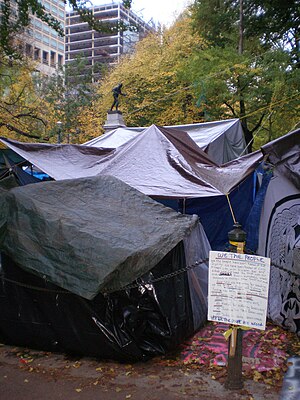|
|
| English: Occupy Portland, November 2, 2011 (Photo credit: Wikipedia) |
By Sarah Morrigan
LC founder/organizer/general manager
Time flies and it's already two years since the beginning of
Occupy Portland as well as that of then-Interfaith Guild of Chaplains. Many people who were at the encampment have moved out of town, moved on with their own lives, and honestly, many people left disillusioned by the inefficient, dysfunctional and aimless "movement."
During the past two years, Occupy Portland underwent a succession of organic changes. The once-vocal extreme radical-left factions had left, after realizing that they would never get what they wanted. The homeless rights activism continued with the city hall vigil for over 600 days (making it the longest continuing physical occupation in the world), but now with their own internal problems they are largely joining efforts with the more structured Right2Survive and their fight for Right2Dream Too.
With two of the most visible and vocal manifestations of Occupy Portland gone, the movement and everyday work appears forgotten. But they are there. The most functional and longest-running working groups are still continuing with their work, but they are the least visible and are under-appreciated (for example, Occupy Solutions and the Elder Caucus).
Friends of Occupy Portland recently (and finally) got their corporate paperwork problems straightened out, and with a smaller budget it still operates the office space as a resource to the community.
These are natural processes that occur to most mass movements I know in history. Soundclip-worthy public visibility brings attention of TV stations, but it is the behind-the-stage hard work and persistence by a small number of committed citizens that make the real difference.
As I see it, this is a fertile time for the work that began with Occupy Portland -- a work that is truly for the 99 percent. This movement became distracted and became inefficient when the radicals took control and attention, and became overly focused on the extremely marginalized population (chronic homeless, among others) very few could understand or relate to. The movement of the 99 percent became a movement of the 0.5 percent, and the initial supporters of Occupy no longer felt that their voices were represented by the continuing show of anarchists in black outfit and dishevelled homeless taking their anger at businesses, all businesses, never mind that small- and mid-sized businesses support a lion's share of our economy, revitalize the neighborhoods, and create jobs. Contrast this with the first two weeks, the glorious golden days of Occupy Portland, where the camp and the movement were friendly to families with children and were supported by local small/mid-sized business owners.
Much of the problem has to do with Occupy Portland's inability (unwillingness) to connect to existing and established groups and work together. When the
Pacific Green Party came, we pissed them off. When the
Working Families Party came, we treated them as though it was an infiltrator. When
MoveOn came with its huge roster of supporters, we rejected them. Unlike the Tea Party, we failed to connect where the power to effect changes was.
The Tea Party (unfortunately) succeeded in hijacking Congress and local/state politics, but Occupy did not. We might have been the biggest Occupy on earth at one time, but we never got our sh*t together (there are the ones who did, like the ones in New York and Hong Kong).
In 2013, the core Occupy Portland organization (that is, the FOOP, the information team, and the outreach) has been re-envisioning itself as the connector, a nexus of information and groups. During the
August capacity-building conference, this theme of building authentic connections has come up repeatedly and was identified as the main challenge to overcome.
And this is where I feel that the Lightspark Commons, as a group of people with roots in faith-based communities, can make a huge difference. In American history, churches and religious-based groups were fundamental units of community organizing. The
Civil Rights movement, the temperance movement, the
anti-slavery movement, and just about every movement that made a lasting mark in the U.S. history, organized around churches and church membership. If Occupy were to ever go back to the initial level of support and strength, it can only do so by re-engaging and galvanizing the middle class. The middle class is the only part of the 99 percent that has sufficient capacity, influence, education, and financial means to get things done. The truth about our local politics is that the elected politicians only listen to business owners and business leaders. Whether we like it or not, this is how the city, county, and state politics work here. Other "community organizers" and "activists" are usually only seen as convenient background noises and are never taken seriously, unless their message aligns with pre-existing political agenda of an elected official (to advance his or her own political ambition, of course). Those who are barely surviving with three jobs just to feed themselves and their kids do not have time or energy. The faith-based perspectives also moderate the extremism that comes with the radical-left organizing.
On a more practical level, there are much that must be done and there are specific areas you can get involved.
- Strike Debt is a faith-based project that started in New York and Occupy Portland has been a sponsor of the local chapter.
- Occupy Portland outreach has been present at many street fairs and Sunday Parkways events this summer, and this was instrumental in creating visibility and re-engaging people. The outreach must necessarily move indoors during winter months and church-based community events (such as "mindful holiday gifts bazaar" or Christmas fairs) can be good outreach opportunities.
- Friend of Occupy Portland, the legal/corporate entity for the service of the Occupy Portland community, could use a few good, committed volunteers in board, administrative and non-board positions, as well as in (perhaps most importantly) helping with planning fundraisers.
So we are not dead yet -- just new opportunities.
Sarah







